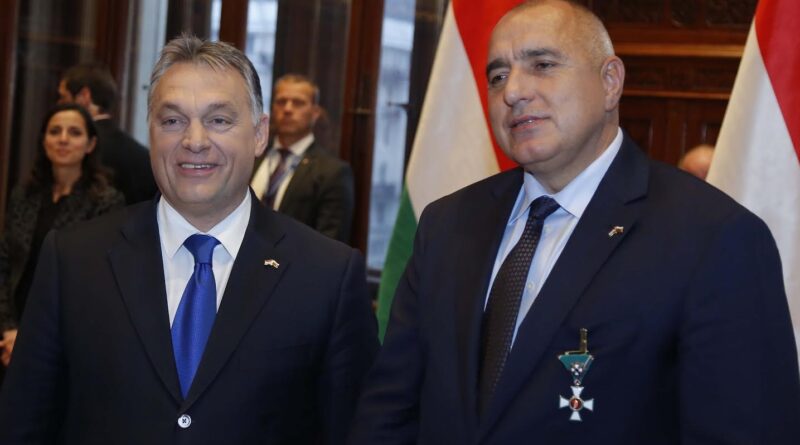Geopolitical and Economic Risks of a Potential Sale of Lukoil’s Bulgarian Assets to Hungary’s MOL
Key Events
Orban’s Visit to Bulgaria
Hungarian Prime Minister Viktor Orban’s recent visit to Bulgaria was celebrated as a diplomatic success, with President Rumen Radev and former Prime Minister Boyko Borissov commending his support for Bulgaria’s bid to join the Schengen area. While the official focus was on Hungary’s advocacy of Bulgarian interests, the visit also advanced Orban’s broader political agenda within the EU, Central and Eastern Europe (CEE), and the Western Balkans.
Behind-the-scenes discussions reportedly centered on MOL’s potential acquisition of Lukoil’s Bulgarian assets, with Orban seeking political backing from his Bulgarian hosts. Their subsequent silence—despite outwardly amicable post-meeting appearances—suggests discomfort with their decision. They likely recognize that replacing direct Russian influence with indirect Russian influence, combined with the risks posed by Orban’s growing business network, could jeopardize Bulgaria’s national security and its commitments to the EU and NATO.
Russia’s Influence
If MOL—a company with historical ties to Russia and originally funded through Russian energy trading—acquires Lukoil’s Bulgarian assets, it could solidify Russia’s indirect control over a key strategic resource in Bulgaria. This outcome would likely extend Russian influence in the region and draw Bulgaria closer to Orban’s pro-Russian bloc within the EU and NATO.
Signs of Bulgaria’s alignment with Orban’s interests are becoming more apparent, especially in its role as a crucial gateway for Russian natural gas—the financial foundation of Orban’s power. Bulgaria’s continued involvement in Russian gas transmission positions it in alignment with Orban’s stance within the EU and NATO, particularly in opposition to sanctions targeting Russia’s energy sector. Acquiring ownership of the largest refinery in the Balkans would further solidify Orban’s influence over Bulgaria’s political future, mirroring the control he exerts in Slovakia, Serbia, and North Macedonia. It will also strengthen the personal bond between the leaders of the so-called TurkStream coalition—Erdogan, Radev, Borisov, Vucic, and Orban.
US Sanctions and Gazprombank
Hungarian Foreign Minister Péter Szijjártó recently announced a temporary lifting of US sanctions on payments for Russian gas to Gazprombank, highlighting Hungary’s precarious balancing act between its pro-Russian energy policies and US-encouraged European energy diversification efforts.
While Bulgaria has expressed interest in diversifying its energy sources—through US nuclear technologies, purchase of US nuclear fuel and LNG imports—its heavy dependence on Russian energy, mostly gas and oil, keeps it firmly within Moscow’s sphere of influence.
Ideological and Economic Tensions
Orban’s energy strategy, deeply rooted in Russian resources, conflicts with US and EU goals to reduce dependence on Moscow. Hungary’s reliance on Russian nuclear power, oil, and natural gas reveals persistent vulnerabilities that undermine the EU’s collective energy security framework.
This tension is compounded by Orban’s ideological alliance with former US President Donald Trump, despite Hungary’s lack of substantive trade in US LNG, oil or nuclear technology. Simultaneously, Hungary has become a major conduit for Chinese technology and strategic investments, further complicating its geopolitical position.
By brokering Russian energy deals and leveraging his relationships with key global actors, Orban consolidates his power in the EU and obstructs efforts to disentangle European energy systems from Russian control.
Europe’s Crackdown on Orban’s Strategic Asset Acquisitions
EU skepticism regarding Hungarian acquisitions of major assets provides critical context for MOL’s potential deal with Lukoil:
- Romania: Blocked MOL’s earlier attempt to acquire Lukoil’s Petrotel refinery, citing national security concerns.
- Spain: In August 2024, Spain barred Hungary’s Ganz-Mávag Europe from acquiring train manufacturer Talgo, citing national security risks and potential ties to Russia.
- Croatia: A Croatian court sentenced former Prime Minister Ivo Sanader to prison and convicted MOL CEO Zsolt Hernádi of bribery, further tarnishing MOL’s reputation in the EU.
Hungarian energy trading platforms, including the RBP Transmission Capacity Trading Exchange and exchanges such as CEEGEX (gas) and HUPX (electricity), have bolstered Hungary’s role as a Central European energy hub and its brokerage value for Moscow in facilitation access for Russian energy to the EU.
Financial Viability Concerns
- Dependence on External Financing: Recent MOL’s financial statements reveal insufficient resources to independently acquire Lukoil’s Bulgarian assets at the expected price, raising questions about potential Russian or oligarchic financial backing.
- Crude Oil Supply Challenges: MOL faces difficulties securing crude oil for its existing refineries, making operations at the 200,000 barrels-per-day Burgas refinery risky in terms of both supply volume and origin. Suspected laundering of Russian oil through ship-to-ship transfers in Burgas Bay compounds these risks.
Implications for Bulgaria and Europe
- Energy Security Risks: A sale to MOL could undermine EU unity, particularly as other member states have previously blocked Hungarian acquisitions on national security grounds.
- Bulgarian Government’s Role: Legislative reforms under Prime Minister Nikolay Denkov have strengthened Bulgaria’s ability to manage crises involving strategic assets such as the Bourgas refinery and Lukoil infrastructure. These measures, including potential state control over the Burgas refinery, could safeguard national interests and prevent the misuse of Bulgarian assets to further Moscow’s agenda.
In January 2023, Bulgarian lawmakers authorized temporary state control of the Burgas refinery if national security concerns arose. A final decision by the National Assembly to purchase the refinery and seek a genuine strategic investor would ensure Bulgaria’s long-term energy security and independence.
A potential sale of Lukoil’s Bulgarian assets to MOL poses significant geopolitical, economic, and strategic risks. Beyond consolidating Russian influence, such a deal raises concerns about the financial sustainability of the Burgas refinery, its role in laundering Russian oil and implications for regional energy security. Given the EU’s precedent of blocking similar acquisitions and Hungary’s strained relations with European partners, the Bulgarian government must carefully assess the long-term consequences of this transaction. Bulgaria’s best course of action may involve directly acquiring the refinery and securing a credible strategic investor, thereby safeguarding its energy independence, national security, and alignment with EU and NATO priorities.
Ilian Vassilev




